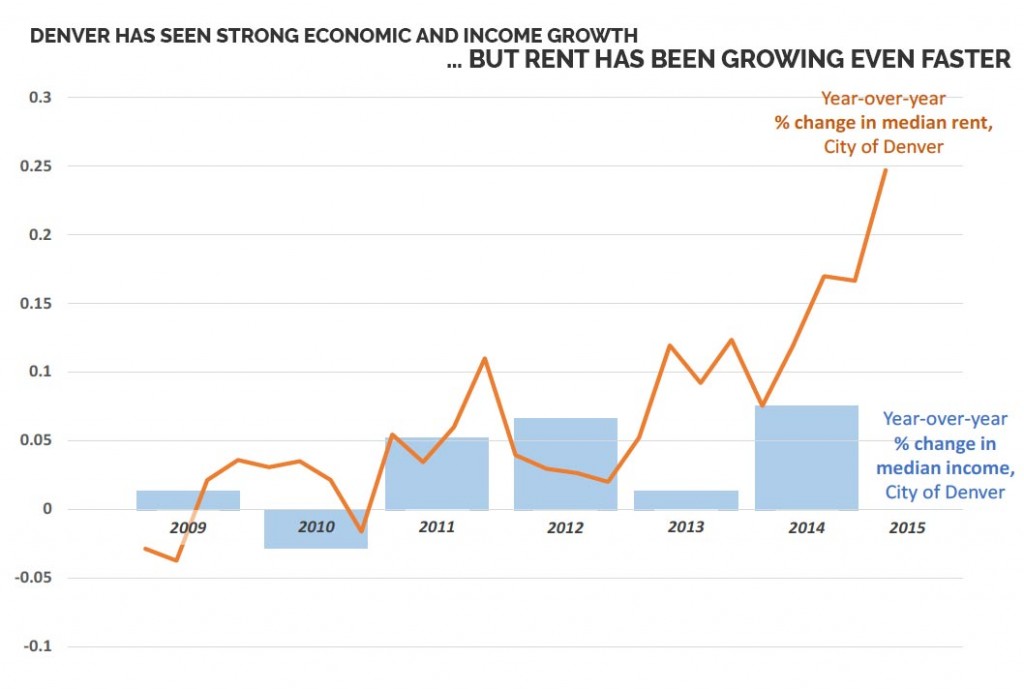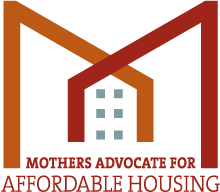 Why is this a problem in Denver?
Why is this a problem in Denver?
- Denver is experiencing steady population growth, with the metro area adding about 200,000 residents since 2010. With demand for homes rising, developers mainly have incentive to build for upper-income workers rather than folks who are earning less money.
- While rents are up, wages have remained stagnant. An estimated 600,000 Coloradoans have jobs that pay less than $12 an hour.
- The market rate rent for two-bedroom rental unit in the Denver metro area is $1,156 per month, according to the Department of Housing and Urban Development.
- To afford that rent, a household would need to make more than $46,000 per year, or – or 2.7 full time jobs at the minimum wage, according to a 2015 report from the National Low Income Housing Coalition.
Why is it so important to address the lack of affordable housing?
- Investments in affordable housing pay dividends for families, seniors and workers, as well as for Denver’s overall economy and quality of life.
- Affordable housing is vital to connecting low and moderate-income residents to quality healthcare, childcare, education, transportation, healthy food, workforce training, and good paying jobs – basically everything people need to succeed.
Who is most affected by the affordable housing crisis?
- In the last 10 years, the number of families in this situation has surged.
- More than a third of affected folks in Colorado are families with children.
- About 14 percent statewide are seniors.
- Administrative support workers, food service employees, and building maintenance workers are among those particularly affected.
What are the effects of a lack of affordable housing on children in our community?
- Each year a child spends in a healthy neighborhood increases the likelihood of higher earnings, improved health and other positive outcomes, according to research from Harvard’s Raj Chetty.
- When children are raised in distressed neighborhoods, the impacts last a lifetime.
- When their families struggle to afford rent, children are often forced to move frequently.
- Research shows that one change in elementary schools is equal to missing out on four weeks of progress in math and reading. And kids who move more than twice in a year are more likely to be hospitalized.
Denver already has some apartments that are affordable to lower-income people. What about those?
- With rapidly gentrifying neighborhoods all over the city, it is crucial that Denver preserve the lower-priced rental homes currently available for the working families and seniors who need them.
- It will give people who already live and work in the community a chance to stay and contribute to the neighborhood’s social fabric.
What can new development or rehabbing older buildings do for my community?
- Families and neighborhoods remain more stable, especially for those who have lived there for a long time. Plus, it makes economic sense – updating an existing building can cost 30 percent less than building a new one.
How would more affordable housing benefit our community and our economy?
- Building more affordable housing in Denver – rental homes that are affordable to families earning $48,000 or less – would generate more than $80 million in revenue for the local economy and create 1,000 new jobs in the first year alone.
- Over a five-year period, building and preserving affordable housing would result in an estimated $500 million in revenue for Denver and create over 7,000 new jobs.
